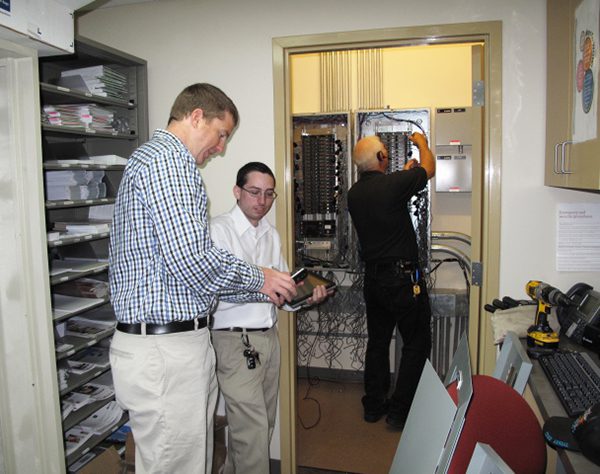SIBS Improving Environment through More Efficient Buildings

Determining the most efficient ways to operate buildings, the Sustainably Integrated Buildings and Sites (SIBS) program is helping businesses reduce energy consumption, which saves them money and at the same time decreases greenhouse gas emissions.
SIBS is a National Science Foundation Industry/University Cooperative Research Centers (I/UCRC) program. With UNC Charlotte as the lead site for the cooperative program, SIBS conducts research that promotes improved energy use, water use, air quality and productivity in buildings.
“You can think of SIBS mission as improving smart buildings within the smart grid within the overall built and natural environments,” said Dr. Rob Cox, director of SIBS and an associate professor in the Lee College of Engineering’s Electrical and Computer Engineering Department. “We’re looking at the building’s role in the overall ecosystem.”
Universities partnering with UNC Charlotte in SIBS are Carnegie Mellon and the City College of New York. Industry and community members are Wells Fargo, Bank of America, Johnson Controls, Ingersoll Rand, New York City Department of Citywide Administrative Services, Vornado Realty Trust, the Pittsburg Energy Innovation Center, and Pittsburg Green Innovators.
Industry/community members contribute $50,000 a year to SIBS. An industrial advisory board of member representatives decides what projects are performed. The National Science Foundation provides SIBS with administrative support and oversight.
“Faculty members propose projects to the board,” Dr. Cox said. “The projects must be industrially relevant with a clear set of deliverables. Companies want to see results. And all the results are shared with all members.”
SIBS researchers are now on the second round of one-year projects. One example of a successful project is a benchmarking study for retail banking branches.
“Two of our members have more than 10,000 banking branches between them,” Dr. Cox said. “By understanding where energy consumption is coming from by looking at things such as lighting loads, plug loads and space-conditioning systems, we can develop energy reduction strategies that save money and reduce greenhouse gases.”
Examples of other SIBS projects performed and currently underway include:
- Testing and extending building automation systems
- Development and field testing of energy-performance models
- Controls for thermal comfort systems
- Wireless sensors for building monitoring systems and controls
- Automated analytics for high-performance buildings
- Market analysis of water technologies and conservation solutions
For more information on SIBS see sibs.charlotte.edu or contact Dr. Cox.